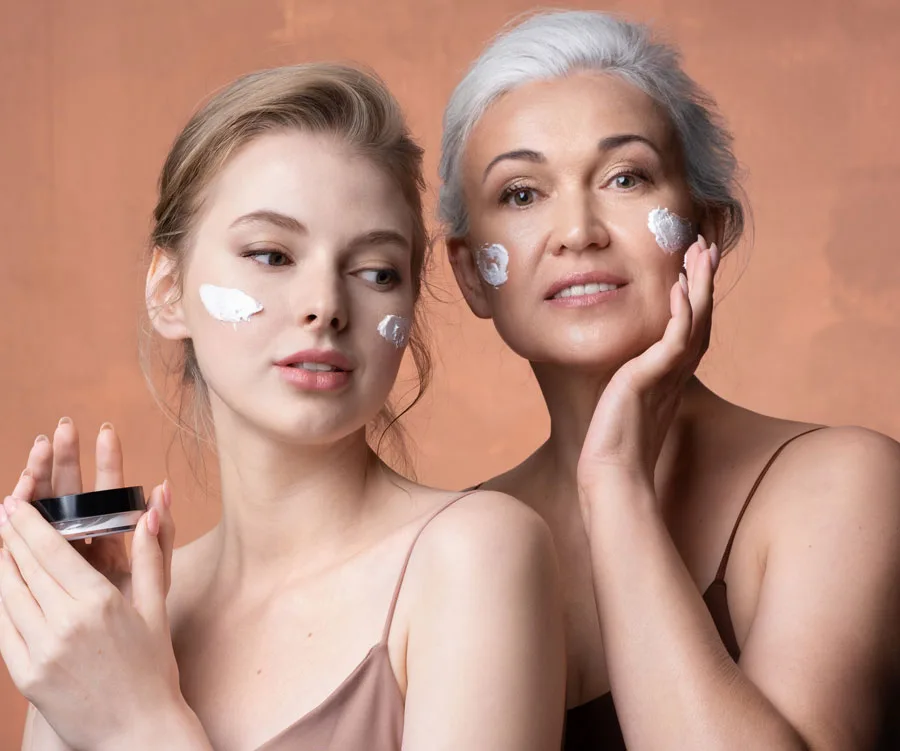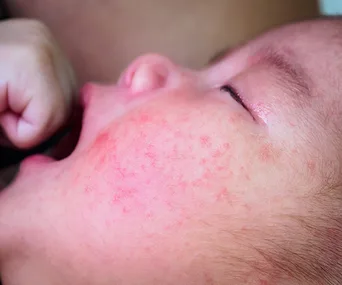It’s called ‘psychodermatology’ – which, in its simplest terms, is the field of science that studies the connection between skin health and mood.
Psychodermatologists have established that stress factors stimulate the release of hormones, which can disrupt the protective function of the skin, leading to inflammation and exacerbating conditions such as acne, psoriasis, urticaria, rosacea and eczema. Conversely, skin conditions can lead to feelings of shame, anxiety, depression and the loss of self-esteem(1).
According to a survey conducted by Are Media Research for QV Skincare, 77 per cent of women agree their confidence is impacted when their skin doesn’t look its best(2). It’s not just the emotional impact, there’s also the social effect, with 26 per cent of women saying they have felt too embarrassed to go out because of their skin condition.
From childhood through to adolescence and menopause, your skin faces varied stresses that can have both emotional and physical effects. Here are four common skin issues and how to help manage them.
Eczema
According to The Eczema Association of Australasia (EAA) more than half of all eczema sufferers show signs within their first 12 months of life, with up to 20 per cent of children experiencing the condition(3).
“Most children grow out of the condition(3), but a small percentage may experience severe eczema into adulthood,” the Association notes. “The condition can not only affect the individual sufferer, but also their family and friends.”(4)
Anna, 48, says she found it just as distressing caring for her young daughter’s skin during flare ups.
“Moisturising her skin was hard, because she was so sore and hated the way ointments and moisturisers felt on her skin,” Anna recalls. “She would cry and scream and squirm away. I would end up in tears some nights because it was so difficult.”
Anna says a dermatologist suggested switching to a cortisone cream rather than an ointment and trying QV.
“The combination was a game-changer for both of us,” Anna says. “My daughter found the daily application of creams less distressing and her skin condition improved dramatically as a result.”
According to the EAA, eczema triggers can include:
A family history of eczema, asthma or hay fever.
Dairy and wheat products, citrus fruits, eggs, nuts, seafood, chemical food additives, preservatives and colourings.
Stress.
Irritants such as tobacco smoke, chemicals, weather (hot and humid or cold and dry conditions) and air conditioning or overheating.
Allergens such as house dust mites, moulds, grasses, plant pollens, foods, pets and clothing, soaps, shampoos and washing.
Management:
Using a moisturiser at least twice daily, but as often as needed, that is designed for sensitive skin can help to provide relief as it helps to reduce dryness and associated itch.
Well-moisturised skin and a supported skin barrier can help to reduce moisture loss, as well as irritants entering the skin. Topical cortico-steroids are a common treatment prescribed by GP’s and Dermatologists to help reduce inflammation and itchiness.
Always discuss skin concerns with a healthcare professional to ensure you are getting the best care.

Up to 20 per cent of children experience eczema.
(Getty)Sensitive skin
Sensitive skin may have reduced tolerance to cosmetics, personal care products and environmental triggers. It can be irritated by soap, fragrance and other common irritants found in some skin products.
It was the most common skin concern for respondents to the Are Media for QV Skincare survey, with 64 per cent suffering from sensitive skin. The three most common areas of concern were the face (68 per cent), legs (40 per cent) and arms (37 per cent).
Management:
Avoid triggers which could be soaps and products with fragrance. Take notice of the ingredients you choose if you are switching your laundry detergent, bath wash or oil, dishwashing liquids or any other products that come into contact with the skin.

64 per cent of respondents to the Are Media for QV Skincare survey suffer from sensitive skin.
(Getty)Dry skin
Dry skin was the second biggest concern for respondents to the Are Media for QV Skincare survey, affecting 58 percent of women.
If dry skin is not managed, it can lead to flakiness or scaliness, redness, rough texture, itchiness or irritation, cracks or stinging or burning sensations. Skin is particularly prone to dryness during the winter months, due to cold air, dry indoor heat and low humidity levels.
“My fair skin is always sensitive, but it becomes really dry and sore on my face, calves and hands during winter if I don’t keep an eye on it,” said Anita, 38. “I’ve learned that the moment I feel dryness occurring I need to boost my moisturising routine as tackling it early makes it much easier to control.”
Management
Avoid having showers or baths that are too hot, as they can dry out your skin. As soon as you get out of the bath or shower, while your skin is still damp, apply a cream on top to lock that moisture into the skin.
Other tips:
Consider buying a humidifier to help add moisture back into the air during the winter months.
Keep a travel-size moisturiser in your handbag so you can reapply the cream when you’re on the go. If your favourite intensive product isn’t available in mini-form, buy a refillable travel bottle or tube from the pharmacist and fill it with the cream that works best on your skin.

Skin is particularly prone to dryness during the winter months, due to cold air, dry indoor heat and low humidity levels.
(Getty)Menopause
Declining estrogen during perimenopause and menopause can impact collagen levels. This can result in dry, itchy skin and require changes to your normal skincare routine(4).
During menopause you can also experience thickening of skin on the palms and soles, which can lead to painful cracking and splitting.
Additionally, hormonal changes can cause anxiety and mood swings and acne breakouts.
“I was so surprised and embarrassed when my skin started breaking out in my late forties,” says Kate, 51. “I thought it was something that only happened to teenagers. Suddenly I found myself buying blemish creams after not needing them for years. I felt so awkward about being seen with pimples on my chin. Fortunately, eating inflammation-fighting foods and switching to an oil-free moisturiser really helped settle the breakouts without drying out my skin.”
Management:
Try switching from soap or regular body wash to a mild cleaners instead, and use a heel balm specifically designed to nourish and revive the appearance of dry and cracked heels.
Other tips:
Apply a hand cream several times a day, particularly after washing hands.
Choose a brand for sensitive skin, as some fragranced creams may be irritating.
Talk to your health professional for further advice relating to menopause and the impact it may have on your skin.

Declining estrogen during perimenopause and menopause can impact collagen levels. This can result in dry, itchy skin and require changes to your normal skincare routine
(Getty)Brought to you by QV Skincare.
REFERENCES
Jafferany M. Psychodermatology: a guide to understanding common psychocutaneous disorders. Prim Care Companion J Clin Psychiatry. 2007;9(3):203-213. doi:10.4088/pcc.v09n0306
Are Media Research. Online QV Skin Survey. 2021. Participants aged 18+. Australia. Sponsored by QV Skincare.
Avena-Woods C. Overview of atopic dermatitis. Am J Manag Care 2017;23(8 Suppl):S115–23.
Park S, Kang S, Lee WJ. Menopause, Ultraviolet Exposure, and Low Water Intake Potentially Interact with the Genetic Variants Related to Collagen Metabolism Involved in Skin Wrinkle Risk in Middle-Aged Women. Int J Environ Res Public Health. 2021;18(4):2044. Published 2021 Feb 19. doi:10.3390/ijerph18042044



